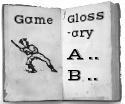Tut-Ball: Difference between revisions
(Set Game Eras to Predecessor) |
No edit summary |
||
| Line 2: | Line 2: | ||
|Term=Tut-Ball | |Term=Tut-Ball | ||
|Game Family=Kickball | |Game Family=Kickball | ||
|Description=<p>Also called Tut, this game was in 1777 called | |Game Eras=Predecessor, 1800s | ||
|Sources=<p><span>Alice B. Gomme, | |Invented Game=No | ||
| | |Description=<p>Also called Tut, this game was in 1777 called “a sort of stool ball much practiced about the Easter holidays,” according to the OED. OED identifies Tut-Ball with [[Stoolball]] and [[Rounders]].</p> | ||
<p>Gomme also cites a view that “This game is very nearly identical with ‘rounders.’” Another writer is known to say that Tut-Ball is the same as Pize-Ball. </p> | |||
<p>Gomme, however reports that balls were hit back with the palm of the hand, not a bat, at least in its earlier form.</p> | |||
|Sources=<p><span>Alice B. Gomme, </span><em>The Traditional Games of England, Scotland, and Ireland</em><span> (Davit Nutt, London, 1898), page 314.</span></p> | |||
|Comment=<p>Gomme, writing in the 1890s, reports that tut-ball was played at Shiffnal, a school for young ladies around 1840. (The town of Shiffnal is northwest of Birmingham.) </p> | |||
<p>She also wrote that "A game of ball, now only played by boys, but a half century ago by adults on Ash Wednesday, believing that unless they did so they wou'd fall sick in harvest time. This is a very ancient game, and was elsewhere called "Stool-ball' indulged in by \the clergy as well as laity to avert misfortune."</p> | |||
<p>She cites other sources as noting the similarity of tut-ball and stool-ball. </p> | |||
<p>One wonders whether some observers may have used “Tut-Ball” generically, to signify any game with “tuts,” or bases.</p> | |||
<p> </p> | |||
|Has Supplemental Text=No | |||
}} | }} | ||
Revision as of 16:08, 13 March 2017
| Game | Tut-Ball |
|---|---|
| Game Family | Kickball |
| Location | |
| Regions | |
| Eras | Predecessor, 1800s |
| Invented | No |
| Tags | |
| Description | Also called Tut, this game was in 1777 called “a sort of stool ball much practiced about the Easter holidays,” according to the OED. OED identifies Tut-Ball with Stoolball and Rounders. Gomme also cites a view that “This game is very nearly identical with ‘rounders.’” Another writer is known to say that Tut-Ball is the same as Pize-Ball. Gomme, however reports that balls were hit back with the palm of the hand, not a bat, at least in its earlier form. |
| Sources | Alice B. Gomme, The Traditional Games of England, Scotland, and Ireland (Davit Nutt, London, 1898), page 314. |
| Source Image | [[Image:|left|thumb]] |
| Comment | Gomme, writing in the 1890s, reports that tut-ball was played at Shiffnal, a school for young ladies around 1840. (The town of Shiffnal is northwest of Birmingham.) She also wrote that "A game of ball, now only played by boys, but a half century ago by adults on Ash Wednesday, believing that unless they did so they wou'd fall sick in harvest time. This is a very ancient game, and was elsewhere called "Stool-ball' indulged in by \the clergy as well as laity to avert misfortune." She cites other sources as noting the similarity of tut-ball and stool-ball. One wonders whether some observers may have used “Tut-Ball” generically, to signify any game with “tuts,” or bases. Edit with form to add a comment |
| Query | Edit with form to add a query |
| Has Supplemental Text |
Comments
<comments voting="Plus" />
